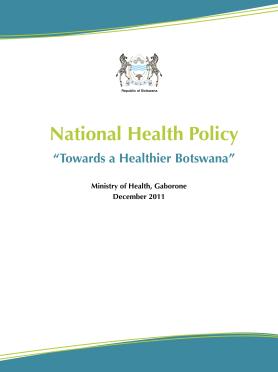National Health Policy - Botswana
National Health Policy - Botswana
The enjoyment of a level of health that allows every citizen to lead an economically and socially productive life is widely accepted as a basic necessity in any population. The World Health Organisation (WHO) defines health as “a state of complete physical, mental, and social well-being and not merely the absence of disease or infirmity”. Botswana has been trying to attain this level of health status through improvements in the health sector over the years. Since 1995, the first National Health Policy has guided the health sector towards attaining of the highest level of health status for all people living in Botswana.
Since the development of the first national health policy, there have been major changes in both health status and in the organisation of the health sector in the country. Changes include the disease burden, demographics and the socio-economic determinants of health. The recognition that health is a right to be enjoyed by all Batswana has also grown over this period.
A major reorganisation of the Ministry of Health, as well as the management of Primary Health Care within the Ministry of Local Government, began in 2002 and is still in progress. Since the last national health policy was developed, the number of health sector stakeholders has increased, the population has grown and lifestyles have changed. There have also been many changes in health technologies for health promotion, prevention and treatment and the rehabilitation of people - including those with disabilities.

